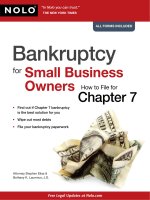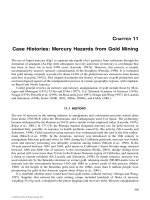Applying career development theory to counseling, 6e chapter 11 and 12
Bạn đang xem bản rút gọn của tài liệu. Xem và tải ngay bản đầy đủ của tài liệu tại đây (74.92 KB, 18 trang )
NARRATIVE CAREER COUNSELING
CLIENT AS STORYTELLER
Client:
Agent (author) (protagonist)
Client’s environment:
Setting
Client’s experiences:
Action
Client’s abilities, friends,
family or employers:
Instruments
Client’s changing mind
about career paths:
Wavering
COPYRIGHT © 2014 Brooks/Cole*Wadsworth Publishing Company A
division of Cengage Inc.
1
THE CLIENT’S STORY
Beginning
The problem
Middle
End
Description of obstacles
Counselor and
and instruments used
client work
to reach a goal
together to reach
client’s goal
COPYRIGHT © 2014 Brooks/Cole*Wadsworth Publishing Company A
division of Cengage Inc.
2
GOALS OF ASSESSMENT IN NARRATIVE COUNSELING
Identify a pattern of the individual’s life
Form a sense of the client’s identity by
listening to the client’s story
Find out about the client’s goals for the future
COPYRIGHT © 2014 Brooks/Cole*Wadsworth Publishing Company A
division of Cengage Inc.
3
LIFE DESIGNING
Savickas’s (2011b) constructivist approach to career
counseling has four phases that help the counselor construct
the individual’s story:
1. Construction – Use small stories (micronarratives) to help
clients organize their views of themselves
2. Deconstruct – The counselor listens to the problems within
micronarratives including personal limitations and cultural barriers
3. Reconstruct – The microstory is reconstructed so that
positive outcomes build on client strengths and values
4. Co-construction – A new narrative emerges- a
macronarrative, a positive perspective on career choice,
options and plans
COPYRIGHT © 2014 Brooks/Cole*Wadsworth Publishing Company A
division of Cengage Inc.
with
4
GOAL OF ASSESSMENT FOR CAREER COUNSELING:
IDENTITY
Object – The client is active in the story. For the counselor, the
client is the object of the story.
Subject – The client’s views of him-/herself are the subjects of
the story.
Project - The counselor facilitates the process of telling the
story and fitting it to the client’s identity.
COPYRIGHT © 2014 Brooks/Cole*Wadsworth Publishing Company A
division of Cengage Inc.
5
COCHRAN’S NARRATIVE CAREER COUNSELING EPISODES
Making Meaning out of the Career Narrative
1.
Elaborating a career problem
2.
Composing a life history
3.
Founding a future narrative
A Focus on Being Active
4.
Constructing a reality
5.
Changing a life structure
6.
Enacting a role
Ending
7.
Crystallizing a decision
COPYRIGHT © 2014 Brooks/Cole*Wadsworth Publishing Company A
division of Cengage Inc.
6
DIMENSIONS OF CAREER ADAPTABILITY
Concern – Planning and preparing for the future
Control – Taking control over one’s issues
Curiosity – Questioning one’s choices
Confidence – Being able to explore possibilities
COPYRIGHT © 2014 Brooks/Cole*Wadsworth Publishing Company A
division of Cengage Inc.
8
DEVELOPMENTAL TASKS OF CAREER ADAPTABILITY
Growth
Exploration
Establishment
Management (Maintenance in Super’s theory)
Disengagement
COPYRIGHT © 2014 Brooks/Cole*Wadsworth Publishing Company A
division of Cengage Inc.
7
LIFE THEMES
Based on Adlerian Theory
Lifestyle
Early recollections
Five major life tasks reflect social interest
Self-development
Spiritual development
Occupation
Society
Love
COPYRIGHT © 2014 Brooks/Cole*Wadsworth Publishing Company A
division of Cengage Inc.
9
CAREER STYLE INTERVIEW
Three role models
Magazines
Favorite television show
Hobbies
Favorite sayings
What were your favorite subjects in school
COPYRIGHT © 2014 Brooks/Cole*Wadsworth Publishing Company A
division of Cengage Inc.
10
CAREER COUNSELING USING THE CAREER CONSTRUCTION THEORY
Reviewing counseling goals
Attending to verbs
Moving from preoccupation to occupation
Role models as a suggestion for a plan
Profiling adaptability
Appraising vocational personality
Crafting a success formula
The life portrait
COPYRIGHT © 2014 Brooks/Cole*Wadsworth Publishing Company A
division of Cengage Inc.
11
Chapter 12
ROE’S THREE TYPES OF PARENTAL
ATTITUDES AND TYPES OF PARENTING
Concentration of the child
Overprotective parent
Overdemanding parent
Avoidance of the child
Emotionally rejecting parent
Neglectful parent
Acceptance of the child
Casually accepting parent
Lovingly accepting parent
COPYRIGHT © 2014 Brooks/Cole*Wadsworth Publishing Company A
division of Cengage Inc.
12
PATTERNS OF ATTACHMENT
Secure – Child reacts well to caregiver and other
people
Anxious-Ambivalent – Child is anxious due to
inconsistent parental behavior, child is
uncertain
about self and has limited
exploration
Avoidant – Child ignores or rejects care, develops a
sense of being alone and a lack of trust
COPYRIGHT © 2014 Brooks/Cole*Wadsworth Publishing Company A
division of Cengage Inc.
13
ATTACHMENT THEORY AND CAREER
DEVELOPMENT
Do secure patterns of attachment promote career
exploration?
Do secure patterns of attachment promote a strong sense
of vocational identity?
COPYRIGHT © 2014 Brooks/Cole*Wadsworth Publishing Company A
division of Cengage Inc.
14
PATTERN IDENTIFICATION EXERCISES
Purpose: To identify strengths and weaknesses
Discuss a leisure activity that went well
Discuss a time the leisure activity did not go well
Students: Assess their strengths and weaknesses
Look for patterns of strengths and weaknesses
Look for how patterns can affect career choices
Parents: Comment on the student’s observations
COPYRIGHT © 2014 Brooks/Cole*Wadsworth Publishing Company A
division of Cengage Inc.
15
PARENT INVOLVED CAREER EXPLORATION COUNSELING
1. Introduce process to student and parents.
2. Use Pattern Identification Exercises to identify strengths and
weaknesses.
3. Discuss student’s preferred activities and courses as well as
performance.
4. Discuss labor market and how to make a career choice.
5. Next steps: Counselor discusses community resources and makes
suggestions as to what to do next.
Parents comment throughout all steps
COPYRIGHT © 2014 Brooks/Cole*Wadsworth Publishing Company A
division of Cengage Inc.
16
FAMILY SYSTEMS THERAPY: IMPLICATIONS
FOR CAREER DEVELOPMENT
Disengaged family – Family responsibilities controlled by
one
parent
Enmeshed family – Family responsibilities are unclear
Genograms
Occupations of family members
Relationship of occupations of others to career
choices of client
Occupational Transmission Genogram- questions about
careers, gender, and race
COPYRIGHT © 2014 Brooks/Cole*Wadsworth Publishing Company A
division of Cengage Inc.
17
BLUSTEIN’S SEVEN PROPOSITIONS
1. Thoughts and feelings about relationships influence thoughts
and feelings about work (destructive or constructive).
2. Thoughts and feelings about relationships influence how they
deal with issues at work and plans for work.
3. Work and relationships occur in the workplace and in caregiving
situations.
4. Decision making and actions at work can be affected by
relationships with others.
5. The content of the decisions made at work are affected by
relationships with others. These and individual and
cultural
experiences affect occupational interests and values.
6. Through relationships with others individuals find meaning in
work. Cultural background is an influence also.
7. Culture can provide a sense of security and a feeling of
belonging in relationships that aids work transitions.
COPYRIGHT © 2014 Brooks/Cole*Wadsworth Publishing Company A
division of Cengage Inc.
18









